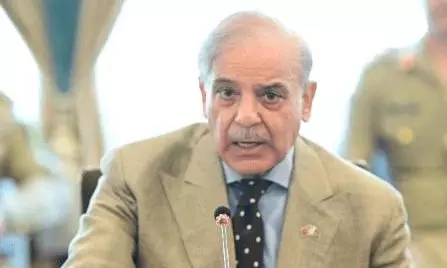
- Home
- India
- World
- Premium
- THE FEDERAL SPECIAL
- Analysis
- States
- Perspective
- Videos
- Sports
- Education
- Entertainment
- Elections
- Features
- Health
- Business
- Series
- In memoriam: Sheikh Mujibur Rahman
- Bishnoi's Men
- NEET TANGLE
- Economy Series
- Earth Day
- Kashmir’s Frozen Turbulence
- India@75
- The legend of Ramjanmabhoomi
- Liberalisation@30
- How to tame a dragon
- Celebrating biodiversity
- Farm Matters
- 50 days of solitude
- Bringing Migrants Home
- Budget 2020
- Jharkhand Votes
- The Federal Investigates
- The Federal Impact
- Vanishing Sand
- Gandhi @ 150
- Andhra Today
- Field report
- Operation Gulmarg
- Pandemic @1 Mn in India
- The Federal Year-End
- The Zero Year
- Science
- Brand studio
- Newsletter
- Elections 2024
- Events
- Home
- IndiaIndia
- World
- Analysis
- StatesStates
- PerspectivePerspective
- VideosVideos
- Sports
- Education
- Entertainment
- ElectionsElections
- Features
- Health
- BusinessBusiness
- Premium
- Loading...
Premium - Events

The Pahalgam attacks come at a time when a slew of geopolitical changes have occurred in the Asian region and elsewhere
The terrorist attack in Pahalgam, killing at least 26 Indian tourists, may have been meant to extract maximum mileage, given that the United States Vice-President JD Vance was in India and Prime Minister Narendra Modi was visiting Saudi Arabia at the time of the attack.
It is doubtful, however, if it serves any purpose for the killers and their handlers as the attack comes at a time when Kashmir as an issue appears to have lost its bite in global forums and among nations that generally supported Islamabad’s view on the issue.
Kashmir issue has lost its bite
In the last few months, even nations like Turkiye (the official name for Turkey) that have backed Pakistan’s position on Kashmir for decades have chosen not to bring up the dispute in international forums like the United Nations. Turkiye President Recep Tayib Erdogan, during his address to the UN General Assembly in September last year instead chose to focus on Gaza.
Also read: Post Pahalgam terror attack, 'alpha male' Modi faces his sternest challenge yet
Moreover, Turkiye foreign ministry was among the first to condemn the Pahalgam attack. Similarly, Iran, too, which in recent years has intermittently taken a pro-Pakistan position on Kashmir, was among the countries that condemned the April 22 attack.
Pakistan itself officially distanced itself from the attack, notwithstanding its credibility. The denial, expectedly, hasn’t cut much ice with India, with the Modi government taking a slew of diplomatic steps against its neighbour.
While these are immediate reactions, the Kashmir dispute finds itself at the centre of attention at a time when significant geopolitical changes have occurred since the previous one – the 2019 Pulwama attack that killed at least 44 Indian paramilitary troops -- and the earlier Mumbai terror attacks of November 2008 that targeted civilians in Mumbai, killing at least 174 people including 20 security personnel and 26 foreign nationals.
Dynamic friendships
Though speculative at this stage, the question is whether Pahalgam had anything, by way of retaliation, to do with the recent extradition from the US to India of Tahawwur Rana, holding dual Pakistani-Canadian citizenship, who was among the alleged planners of the Mumbai 26/11 attacks.
Or, if it was in retaliation to the recent train hijack in Pakistan’s restive Balochistan province, claimed by the separatist Baloch Liberation Army (BLA). Pakistani officials were quoted by the media as having accused India and Afghanistan of being “enablers and facilitators” behind the hijack. The train’s ambush, taking of around 400 rail passengers as hostages, and the rescue by Pakistani security forces took the lives of around 40 people.
The Pahalgam attacks come at a time when a slew of changes have occurred in the Asian region and elsewhere as far as relations among nations are concerned. Saudi Arabia, which was once the key supporter of Pakistan, is now in dalliance with India, while Turkiye, which had friendly relations with New Delhi, is in recent years closer to Islamabad.
Watch: Is Kashmir really terror-free as Centre claims? Pahalgam attack a reality check
Saudi’s place has been taken by Turkey, which is now supplying Pakistan with crucial military equipment and providing strategic support. As a result, Turkiye’s ties with India have stagnated, if not nose-dived. Among other things, India cancelled a high-profile shipbuilding consultancy agreement with Turkiye’s Anadolu shipyard last year. In turn, Turkiye stopped export of weaponry and related equipment to India.
FATF breather
Turkey was also the only country that supported Pakistan at the meeting of the Financial Action Task Force (FATF) in October 2022. Incidentally, Islamabad which was under close scrutiny for its alleged involvement in terror-related activities, including in India, was let off the hook by FATF, which removed it from the so-called “grey list”.
The FATF, a powerful Paris-based organisation of which India is a member, investigates allegations against specific nations of international money-laundering and terrorism financing.
Since 2018, a decade after the Mumbai terror attack, Pakistan had been under investigation by the FATF. India believed that the FATF scrutiny had prevented Islamabad from undertaking any major terror-related action in the country. Pulwama belied this belief. It is significant, though, that the Pahalgam attack occurred two years after the FATF breather for Pakistan.
Turkiye can’t anatagonise India
Turkiye, however, is ambivalent in its ties with India. Its application to join the BRICS nations as a member was met with a tepid response in November last year. It was offered a partner-nation status that falls short of being a full member. There were reports that India had played a role in blocking Turkey’s full membership. However, Turkey denied the reports. For Turkey to be absorbed as a full member of BRICS, it cannot afford to antagonise India. This will mean that its relationship with Pakistan has its limits.
Also read: Red line crossed, India weighs responses to Pahalgam terror attack
BRICS, which had only five countries, including India and China to begin with, recently expanded the organisation, giving membership to countries from West Asia, or the Middle East, including Egypt, the UAE, and Iran.
Other than Turkiye, India in recent years has ensured that its traditional friendly ties with the Islamic world including in the Arab world, has continued. Saudi Arabia, which worked for decades in tandem with Pakistan, is now in the midst of an internal reform that has also seen it open out to other nations, including India.
No support on Kashmir issue
The West, led by the United States, has particularly since the 9/11 attacks, no longer backs Pakistan on Kashmir. US President Donald Trump, in his first term, had even offered to personally step in and resolve the Kashmir dispute. India, however, rejected it under its long-held policy that the dispute should be resolved only bilaterally between the two countries.
Also read: Tourist exodus leaves Kashmiris panicking over livelihoods | Pahalgam attack
China too which is now wooing India aggressively, asking it to increase mutual trade to rebuff Trump’s reciprocal tariffs, has not overtly backed Pakistan on Kashmir. It did complain along with Pakistan when the Modi government abrogated Article 370 and changed the status of Kashmir state into a less powerful union territory. But that apart, it has remained largely silent on the issue.
In short, Pakistan is isolated internationally on its claims over Kashmir even among its allies. Attacks like in Pahalgam will most likely only exacerbate this as the world is moving towards multi-polarity and nations can ill-afford to antagonise any other for specious reasons.


